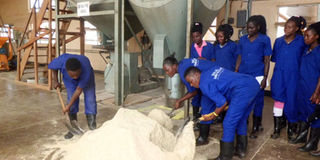Prime
Students trained in agricultural engineering innovation solutions

Students mixing the feed mill at Makerere University Agricultural Research Institute Kabanyolo during the training. The students, mainly studying agricultural engineering courses, undergo the training in this and other skills for a month. Photo by Lominda Afedraru
What you need to know:
- Prof Noble Banadda from Makerere University College of Agriculture and Environmental Sciences, said this during a recent tour of a delegation from the Belgian Embassy in Uganda at MUARIK.
- Alexandre Brecx, the first secretary and deputy head of cooperation at the Belgian Embassy in Kampala, noted that the Belgian government through the former Belgium Technical Cooperation now called Enabel Belgian Development Agency, has been cooperating with learning institutions in Uganda for more than 21 years.
Scientists majoring in Agricultural Science and Engineering at Makerere University Agricultural Research Institute Kabanyolo (MUARIK) are encouraging students from primary schools up to universities to interest themselves in agricultural innovation, particularly in agricultural engineering.
The scientists are teaming up with their colleagues in Belgium universities to impart skills in students from various vocational agricultural institutes and those in primary schools and universities interested in agricultural engineering innovations and feed processing.
Prof Noble Banadda from Makerere University College of Agriculture and Environmental Sciences, said this during a recent tour of a delegation from the Belgian Embassy in Uganda at MUARIK.
The students, who are pursuing certificates, diplomas and degree courses related to agriculture in various institutions including Makerere, are being trained in Bio-systems engineering such as using a tractor to plough, harvest and sow seeds.
So far there are about 2,000 students who come to MUARIK for the skilling project for one month. They are trained in various areas including animal management on farms, processing chicken and animal feed using different ingredients, disease management and agronomy of crops such as the East African Highland Banana (matooke) against banana weevils and bacterial wilt, among others.
Moving with the times
“This initiative is to ensure that our students are up-to-date with innovations in Bio-science agricultural engineering,” Prof Banadda said.
He mentions that in developed countries, governments have established science Pparks where students go to learn science related topics which is not the case in Uganda.
“We are trying to ensure that our students know what it takes for scientists to develop and innovate a new tractor. Therefore, skilling them in mechanisation, irrigation management, maintenance of agricultural machinery and fabrication of food processing equipment is an added advantage,” he said.
The farm manager MUARIK, Chrisystom Tweyambe, explained that the institute receives students from various schools, tertiary institutions and universities to gain skills in agricultural innovations.
This is to encourage young students to embrace agriculture as a business not only as a source of sustaining livelihoods.
“Since the beginning of this year, we have so far sensitised 2,000 students from various institutions across the country and we are aiming at sensitising more than 3,000 by end of August. We have students from Kaahwa Vocational Training Institute in Kakumiro District and Ssese Farm Institute in Kalangala. They are being skilled in feed mill processing, soil treatment and vegetable growing in green houses, Bio- sciences agricultural engineering, goat rearing, cattle breeding, general crop management and agronomy,” Tweyambe explained.
Boosting agriculture
Alexandre Brecx, the first secretary and deputy head of cooperation at the Belgian Embassy in Kampala, noted that the Belgian government through the former Belgium Technical Cooperation now called Enabel Belgian Development Agency, has been cooperating with learning institutions in Uganda for more than 21 years.
He notes that it is easier to collaborate through the alumni network of scientists who have pursued their PhD studies in agricultural science from six different universities in Belgium because they are able to identify areas of interest including skilling students in agricultural engineering.
“The Belgian government is active in skilling the young generation for the labour market. Uganda has a big potential in the agriculture sector and therefore, it is important to invest in skilling students pursuing agriculture-related courses. Scientists at Makerere University School of Agriculture are doing a good job in poultry breeding, goat rearing, fishing breeding and forestry, among others. It is important to translate this knowledge to the young generation for onward growth of the agricultural sector,” he notes.
There was an earlier collaboration with scientists focusing on skilling of students in developing solar powered irrigation systems and other agricultural engineering systems which is due to end in 2020. However, the team is now thinking of possible renewal.
Objectives
Early start. “This initiative is to ensure that students are up to date with innovations in Bio-science agricultural engineering. In developed countries, governments have ensured there are science parks where students go to learn science-related topics. We are trying to ensure that our students know what it takes for scientists to develop and innovate a new tractor. Therefore, skilling them in mechanisation, irrigation management, maintenance of agricultural machinery and fabrication of food processing equipment is an added advantage,” says Prof Noble Banadda



